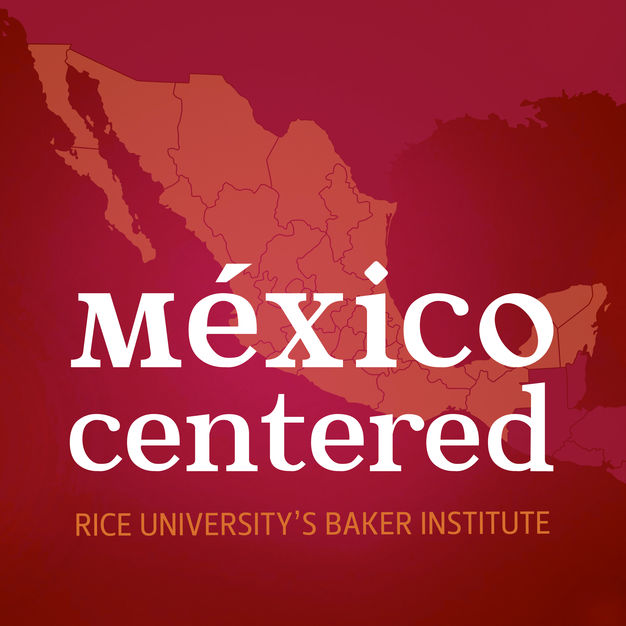
Mexico Centered
Baker Institute Mexico Center
The "Mexico Centered" podcast features interviews with academics, former government officials and other experts on issues central to the U.S.-Mexico relation.
- 36 minutes 19 secondsEpisode 82 - Mexico's Budget Proposal for 2025 (Guest: Mariana Campos)
On November 15, 2024, the Mexican government released its budget proposal for Fiscal Year 2025, which runs from January 1 through December 31. The government pledged to narrow its fiscal deficit from around 6% in 2024 to around 3% in 2025. According to the budget proposal there will be no additional taxes and the economy will grow between 2% and 3% next year. Within the same proposal, the government dramatically increases social spending, but cuts the budget for government goods and services, such as education, healthcare, and infrastructure, among other things. Is that realistic?
Here to discuss where the government plans to make cuts, whether it is realistic to expect a 3% percent growth, what it means for investment, and more is Mariana Campos, head of the prominent think tank “México Evalúa,” which focuses on examining government performance. For 10 years, she served as coordinator of México Evalúa’s Public Expenditure and Accountability Program. She also joined our Center for the U.S. and Mexico as a visiting scholar in 2022.
For more information on the Baker Institute Center for the United States and Mexico visit our website, and follow us on X/Twitter, LinkedIn and Bluesky. To join our mailing list, please subscribe here and make sure to opt-in to "U.S.-Mexico Update.
17 January 2025, 9:22 pm - 24 minutes 14 secondsEpisode 81 - Deportations, Tariffs, Fentanyl: What's next for the US MX Relation (Guest: The Honorable Christopher Landau)
On the campaign trail, Mexico was very much in Donald Trump’s cross-hairs. Now that he’s set to return to office, his pledges — including mass deportation of undocumented immigrants, a 25% tariff on Mexican goods and services, and a “war on drug cartels” — could indeed become reality.
What could these policies look like in practice, and how will they shape the future of the U.S.-Mexico relationship? How might Claudia Sheinbaum, Mexico’s president, respond to this hawkish ideological shift in U.S. politics?
Here to explore what lies ahead is Christopher Landau, who served as U.S. ambassador to Mexico from 2019 to 2021, bridging the first Trump and Biden administration and overseeing the ratification and entry into force of the USMCA, the current North American free trade agreement.
For more information on the Baker Institute Center for the United States and Mexico visit our website, and follow us on X/Twitter, LinkedIn and Bluesky. To join our mailing list, please subscribe here and make sure to opt-in to "U.S.-Mexico Update.
9 December 2024, 1:49 pm - 24 minutes 36 secondsEpisode 80 - AI and the Binantional Relation (Guests: Chris Bronk and Alejandro Dabdoub)
The Center for the United States and Mexico at Rice University’s Baker Institute stays abreast of the many issues affecting the binational relationship–including some issues that are not as intuitive and are often not in the media. One of these is artificial intelligence. To explore what AI can do to the U.S.-Mexico relationship - in academia, security, cybersecurity, and labor - we sat down with Chris Bronk, a nonresident fellow at the Baker Institute and an associate professor at the University of Houston, where he directs the graduate cybersecurity program; and Alejandro Dabdoub, Mexican investor, businessman and writer.
For more information on the Baker Institute Center for the United States and Mexico visit our website, and follow us on X/Twitter and LinkedIn. To join our mailing list, please subscribe here and make sure to opt-in to "U.S.-Mexico Update."
4 November 2024, 2:58 pm - 37 minutes 7 secondsEpisode 79 - Mexico's Judicial Reform (Guests: Javier Martin Reyes and David Gantz)
Mexico’s sweeping overhaul of the country’s court system took effect last month, in the final weeks before President López Obrador handed the keys of the National Palace to his mentee and successor, President Claudia Sheinbaum. Mexico is now one of the few countries in the world that elects its judges, including at the Supreme Court level, by popular vote, rather than by appointment. This widely controversial move has led to protests by the federal judiciary, as well as criticism by the United States, Mexico’s top trading partner.
What exactly does the overhaul entail, and what’s next? Back on the podcast to discuss are Javier Martín Reyes, a researcher and professor at UNAM, the Universidad Nacional Autónoma de México, and David Gantz, the Baker Institute’s Will Clayton Fellow in Trade and International Economics.
For more information on the Baker Institute Center for the United States and Mexico visit our website, and follow us on X/Twitter and LinkedIn. To join our mailing list, please subscribe here and make sure to opt-in to "U.S.-Mexico Update."
23 October 2024, 3:43 pm - 23 minutes 16 secondsEpisode 78: The USMCA Review and Other Trade Challenges (Guest: C.J. Mahoney)
International trade has flourished in recent decades. In the U.S., which is both the world’s largest importer and exporter of goods and services, trade has lowered the costs of everyday goods, raised the living standard, and fueled job growth. But it has also eliminated some jobs, mostly in manufacturing. As a result, support for free trade has declined. Today, American policymakers are embracing industrial policies, which are designed to promote specific sectors, especially manufacturing, in a way not seen since the 1980s. President Biden’s “Buy American” policies are a prime example of this.
How can we rebuild trust in trade and use it to ensure that the U.S. remains competitive globally? In this episode we sit down with C.J. Mahoney, former deputy U.S. trade representative and chief U.S. negotiator for the USMCA, in 2020, and David Gantz, the Baker Institute’s Will Clayton Fellow in Trade and International Economics. We explore major challenges on the horizon for U.S. trade policy, including the upcoming review of the USMCA in 2026 and the rising influence of China.
For video of the event "Election Insights: The Future of US Trade Policy," visit: https://www.bakerinstitute.org/event/election-insights-future-us-trade-policy
For more information on the Baker Institute Center for the United States and Mexico visit our website, and follow us on X/Twitter and LinkedIn. To join our mailing list, please subscribe here and make sure to opt-in to "U.S.-Mexico Update."
26 September 2024, 5:30 pm - 30 minutes 42 secondsEpisode 77: Claudia Sheinbaum and AMLO’s Looming Shadow (Guest: Tony Payan)
Late last month, Mexican President Andrés Manuel López Obrador announced a “pause” in relations with the U.S. embassy. These latest tensions between the two countries came after U.S. Ambassador to Mexico Ken Salazar criticized López Obrador’s proposed judicial reforms, which include electing judges by popular vote. Salazar called this measure “a major risk to the functioning of Mexico’s democracy.”
When Mexican President-elect Claudia Sheinbaum, López Obrador’s protégé, takes office on Oct. 1, she will inherit the strained relationship with the U.S. and a host of other challenges facing Mexico. Tony Payan, director of the Baker Institute Center for the U.S. and Mexico, joined Baker Briefing to discuss the issues setting the backdrop for the new Sheinbaum administration and how she may — or may not — diverge from López Obrador’s playbook.
For more information on the Baker Institute Center for the United States and Mexico visit our website, and follow us on X/Twitter and LinkedIn. To join our mailing list, please subscribe here and make sure to opt-in to "U.S.-Mexico Update."
16 September 2024, 2:24 pm - 19 minutes 56 secondsEpisode 76: Voter Attitudes in Mexico and the US (Guest: Carlos Moreno Jaimes)
In this month's episode of Mexico Centered, Tony Payan sits down with Carlos Moreno Jaimes, professor and researcher at ITESO Universidad Jesuita de Guadalajara, about voter attitudes in the Mexican and U.S. electorates and a recent survey he conducted to look at this issue.
For more information on the Baker Institute Center for the United States and Mexico visit our website, and follow us on X/Twitter and LinkedIn. To join our mailing list, please subscribe here and make sure to opt-in to "U.S.-Mexico Update."
3 July 2024, 2:00 pm - 20 minutes 16 secondsEpisode 75: Mexico's Elections: The Results (Guest: Lorena Becerra)
Tony Payan sits down with Lorena Becerra, political analyst and CEO of Lorena Becerra Encuestas, to analyze the results of Mexico’s presidential election on June 2, 2024.
For more information on the Baker Institute Center for the United States and Mexico visit our website, and follow us on X/Twitter and LinkedIn. To join our mailing list, please subscribe here and make sure to opt-in to "U.S.-Mexico Update."
5 June 2024, 8:19 pm - 25 minutes 22 secondsEpisode 74: Mexico's Post-Presidential Election Scenarios (Guest: Javier Martin Reyes)
In this episode we sit down with Javier Martin Reyes, researcher at the Institute for Legal Research at Universidad Nacional Autónoma de México (UNAM) for a conversation on Mexico's post-presidential election scenarios and their possible legal consequences.
For more information on the Baker Institute Center for the United States and Mexico visit our website, and follow us on X/Twitter and LinkedIn. To join our mailing list, please subscribe here and make sure to opt-in to "U.S.-Mexico Update."
13 May 2024, 3:53 pm - 22 minutes 18 secondsEpisode 73: Mexico's Presidential Elections, the Candidates, Continuity and the Binational Relation (Guest: Carlos Bravo Regidor)
As Mexico's current presidential administration approaches its final days, key questions about the country’s future arise. Some of the critical challenges facing Mexico range from political to democratic principles, such as the growing poverty rate, the state of public safety, and the U.S.–Mexico binational relationship. How will the next presidential administration tackle these issues?
In this episode we have a wide-ranging conversation with Carlos Bravo Regidor, a political analyst for media outlets Expansión Política, Gatopardo, ForoTV, and Radio Fórmula. Joined by the Center for the U.S. and Mexico Director Tony Payan, the two discussed Mexico’s challenges and opportunities for the next presidential administration.
For more information on the Baker Institute Center for the United States and Mexico visit our website, and follow us on X/Twitter and LinkedIn. To join our mailing list, please subscribe here and make sure to opt-in to "U.S.-Mexico Update."
26 April 2024, 3:11 pm - 23 minutes 24 secondsEpisode 72: The 2024 Presidential Elections in Mexico (Guests: Tony Payan, Ivan Rodriguez Sanchez; Edward M. Emmett)
We're back! After a hiatus of almost 2 years the Mexico Centered podcast returns...and just in time for Mexico's 2024 presidential elections. In this episode, a crossover with the Baker Institute's Baker Briefing podcast, host and Baker Institute fellow Edward M. Emmett sits down with Tony Payan, director, and Jose Ivan Rodriguez-Sanchez, scholar, of the Baker Institute Center for the U.S. and Mexico, to look ahead at Mexico's 2024 elections.
For more information on the Baker Institute Center for the United States and Mexico visit our website, and follow us on X/Twitter and LinkedIn. To join our mailing list, please subscribe here and make sure to opt-in to "U.S.-Mexico Update."
25 March 2024, 7:24 pm - More Episodes? Get the App
Your feedback is valuable to us. Should you encounter any bugs, glitches, lack of functionality or other problems, please email us on [email protected] or join Moon.FM Telegram Group where you can talk directly to the dev team who are happy to answer any queries.
 Mexico This Week
Mexico This Week
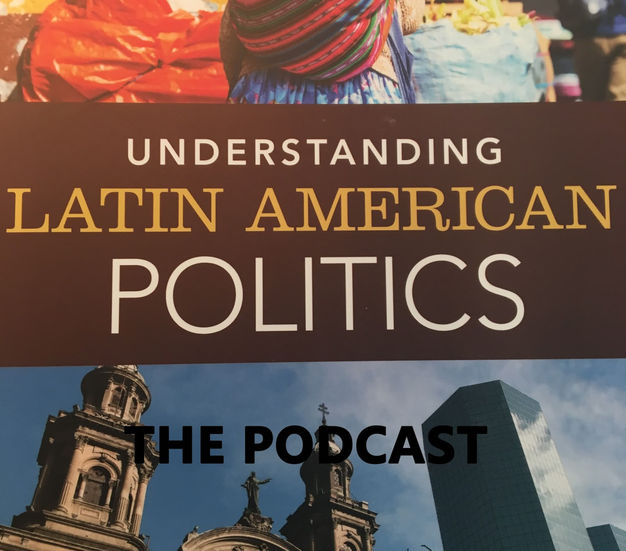 Understanding Latin American Politics: The Podcast
Understanding Latin American Politics: The Podcast
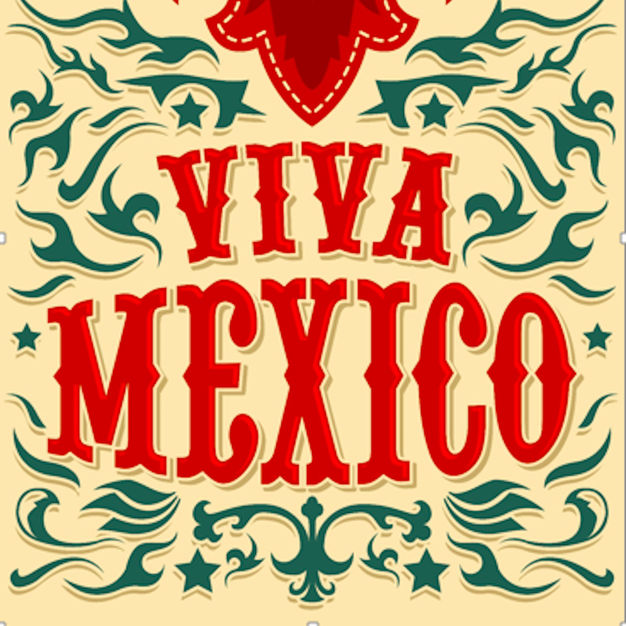 Viva Mexico Podcast
Viva Mexico Podcast
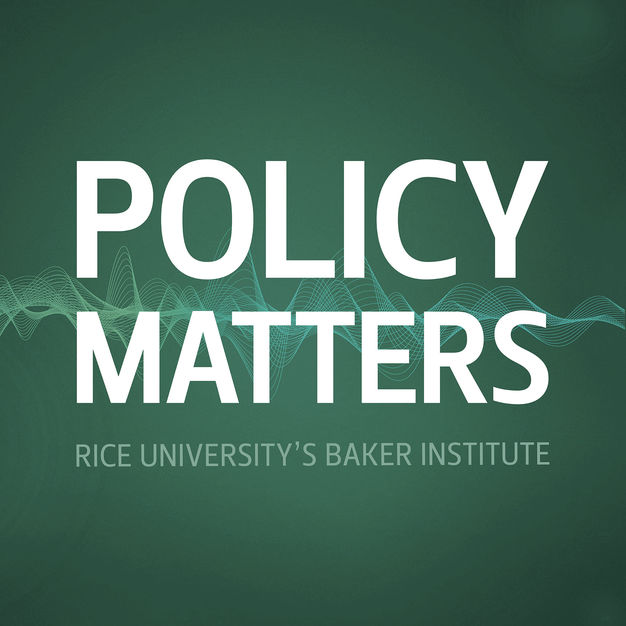 Policy Matters
Policy Matters
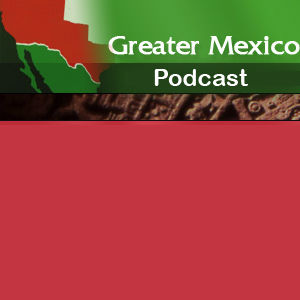 Greater Mexico Podcast » Podcast Feed
Greater Mexico Podcast » Podcast Feed